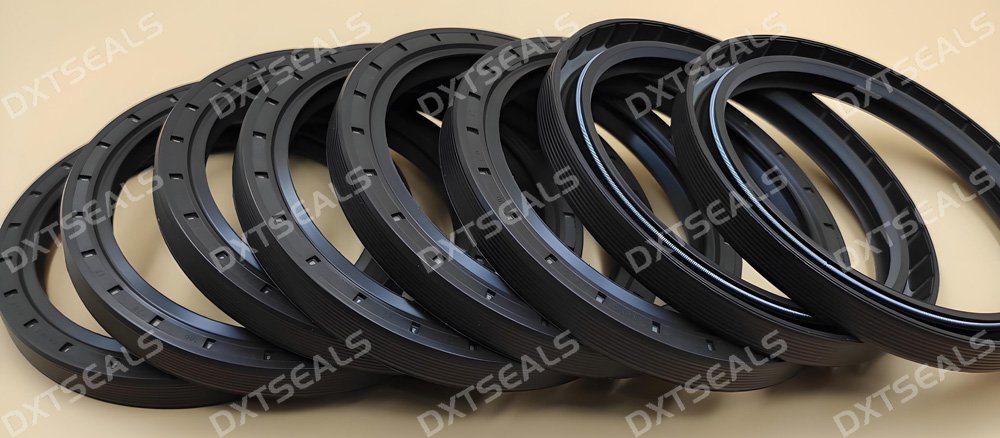
When it comes to keeping machinery running smoothly, oil seals play a critical role in maintaining lubrication and preventing contaminants from entering. Whether you're working in automotive, manufacturing, or industrial applications, choosing the right oil seal is crucial for performance and longevity. With many types of oil seals available, it's important to understand the differences and select the one that suits your machinery’s requirements.
In this article, we’ll explore the various types of oil seals and their applications to help you make the best choice for your machinery.
1. What is an Oil Seal?
An oil seal is a mechanical seal designed to retain lubricants and prevent the leakage of oils or fluids between rotating and stationary components. Oil seals also protect internal parts from dirt, moisture, and other contaminants, thus ensuring efficient operation and extending the life of the machinery.
Oil seals are used in various industrial sectors, including automotive, aerospace, manufacturing, and more. The right oil seal ensures minimal wear, reduces maintenance costs, and improves the overall efficiency of the machinery.
2. Types of Oil Seals
Oil seals come in different materials, designs, and configurations. Each type of seal is suited for specific applications based on factors like temperature, pressure, and the type of fluid being sealed. Here are the most common types of oil seals:
a) Rubber Oil Seals
Rubber oil seals are the most common type, offering a cost-effective and versatile solution for sealing systems. Made from elastomers like Nitrile (NBR), EPDM, or Viton, rubber seals are flexible and can adapt to various environments.
Features:
- Material: Typically made from synthetic rubber or elastomers.
- Temperature Range: Moderate temperature tolerance, generally between -40°C to 120°C.
- Chemical Resistance: Suitable for oils, lubricants, and water, but not ideal for strong solvents or acids.
Applications:
- Automotive engines and transmissions.
- Hydraulic pumps and compressors.
- Industrial machinery requiring general oil sealing.
b) PTFE Oil Seals
PTFE (Polytetrafluoroethylene) oil seals are known for their exceptional chemical resistance and ability to withstand extreme temperatures. PTFE seals are perfect for applications where high temperatures and aggressive chemicals are involved.
Features:
- Material: PTFE (Teflon), which is chemically inert.
- Temperature Range: Can handle temperatures up to 260°C.
- Chemical Resistance: Excellent resistance to oils, solvents, acids, and alkalis.
- Low Friction: Ideal for high-speed applications.
Applications:
- Chemical processing and pharmaceutical industries.
- High-temperature systems in aerospace and automotive sectors.
- Food processing machinery requiring FDA-compliant seals.
c) Metal-Cased Oil Seals
Metal-cased oil seals have a robust outer metal casing that enhances durability and performance, especially in high-pressure or high-speed applications. The metal casing provides additional protection against external forces and environmental factors.
Features:
- Material: A combination of metal casing with elastomer sealing elements.
- Pressure Resistance: Offers high pressure and load resistance.
- Durability: Withstands extreme environments and provides excellent sealing integrity.
Applications:
- Gearboxes and differential seals in the automotive industry.
- Industrial machinery with high-pressure systems.
- Heavy-duty equipment in mining, construction, and marine applications.
d) Spring-Loaded Oil Seals
Spring-loaded oil seals use an internal spring to maintain consistent pressure against the sealing surface, ensuring a reliable and long-lasting seal. The spring keeps the sealing lip in contact with the shaft or housing, which is especially important in fluctuating pressure conditions.
Features:
- Material: Elastomers combined with a metal spring (usually stainless steel).
- Pressure Tolerance: Well-suited for dynamic applications where pressure may vary.
- Enhanced Performance: The spring ensures that the seal maintains contact even in demanding conditions.
Applications:
- Automotive engine seals (e.g., crankshaft seals).
- Hydraulic and pneumatic systems.
- Applications involving rotary shafts and fluctuating pressures.
3. Factors to Consider When Choosing Oil Seals
When choosing an oil seal for your machinery, consider the following factors to ensure optimal performance:
- Temperature Tolerance: Choose an oil seal material that can withstand the temperature extremes of your system. For high temperatures, Viton or PTFE are ideal, while Nitrile and EPDM are suitable for moderate temperature ranges.
- Chemical Compatibility: For applications involving aggressive chemicals or solvents, PTFE or Viton oil seals offer superior chemical resistance. Nitrile seals, however, work best with oils and fuels.
- Pressure and Speed: If your system operates under high pressure or at high speeds, you may need a metal-cased or spring-loaded oil seal for added durability and sealing strength.
- Shaft Motion: For dynamic applications where the shaft undergoes significant movement, spring-loaded seals can provide enhanced sealing performance.
4. Why Choose DXTSEALS for Your Oil Seals?
At DXTSEALS, we specialize in providing high-quality oil seals tailored to meet the unique needs of your machinery. Our wide range of oil seals, including rubber, PTFE, metal-cased, and spring-loaded options, ensures that you can find the right solution for any industrial application.
We also offer custom oil seals, engineered to fit your specific requirements. With our expertise and high-quality products, we guarantee effective sealing, reduced maintenance costs, and improved system performance.
Conclusion
Choosing the right oil seal for your machinery is crucial for ensuring long-term reliability and performance. By understanding the different types of oil seals and their applications, you can select the best option to suit your machinery’s needs. Whether you're dealing with high temperatures, aggressive chemicals, or extreme pressure conditions, DXTSEALS has the ideal sealing solution for your systems.
